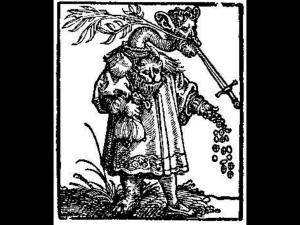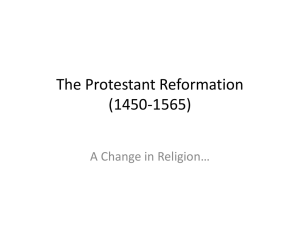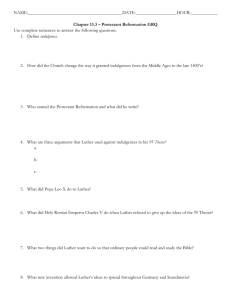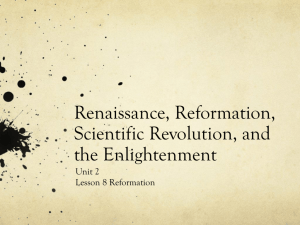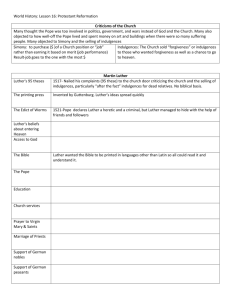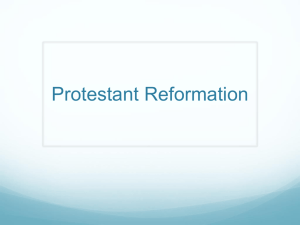Athens has migrated to Florence!
advertisement
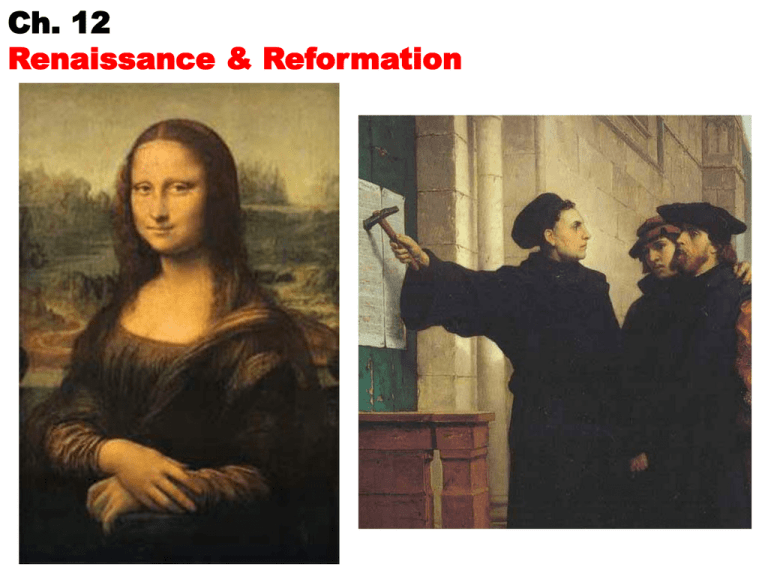
Ch. 12 Renaissance & Reformation I. Renaissance 1350 - 1600 *French for Rebirth *Rebirth of Greek & Roman classical culture A. Italian Renaissance *Italy cultural center of Europe 1. Florence *cultural center of Italy “Athens has migrated to Florence!” 2. Giovanni Medici *credited with starting Ren. building projects beautify Florence Medici *leading family of Florence 3. Lorenzo Medici “The Magnificent” Ruled Florence: 1469 – 1492 Ambassadors *diplomatic agent of a nation Discuss political & commercial affairs Lorenzo Medici By Raphael 2007 sold for $20 Million 4. Isabella d’Este “The First Lady of the World” intelligence & political wisdom ruler of city state of Mantua B. Humanities *basis of Ren. *grammar, history, poetry, & art Classical Education / Liberal Arts education path to virtue & wisdom Latin *key language of the period The Ren. Man *well rounded Indv. “Men can do all things if they will” *Motto of Ren. ex. Leonardo da Vinci Francesco Petrarch 1304 - 1378 “Father of Italian Ren.” searched for old Latin manuscripts across Europe Sonnets to Laura: Great love poems C. Nicolo Machiavelli 1513 The Prince *book political power advice for rulers of Italian city-states “It is safer to be feared than loved!” “End justifies the means!” Machiavellian *person take risks D. High Ren. 1480 - 1520 Realism *art representing natural life 1. Leonardo da Vinci Last Supper Mona Lisa 1503 sold to King Francis I of France Louvre in Paris Da Vinci’s Notebook Sold $30 Million Bill Gates 1994 2. Michelangelo Buonarroti David 1501 The Pieta *Virgin Mary & body of Jesus Sistine Chapel St. Peters Cathedral 1508 – 1512 Vatican in Rome *home of Pope ceiling murals ex. Creation of Adam Pope Julius II *hired Michelangelo Creation of Adam 3. Raphael Madonna's *representations of Virgin Mary School of Athens The Entombment 4. Donatello 1416 sculpture of St. George E. Literature 1. Don Quixote by Miguel de Cervantes *pokes fun of Chivalry 2. William Shakespeare *Greatest Ren. writer Romeo & Juliet, Macbeth, & Hamlet 3. Thomas Moore 1516 Utopia *imaginary ideal society 4. The Book of the Courtier by Castiglione 1528 *handbook for European aristocrats stressed nobles born not made 5. Johann Gutenberg 1450 *1st printing press in Europe Mainz, Germany *Gutenberg Bible 1455 II. The Protestant Reformation Religious Revolution *split with Catholic Church A. Causes of Reformation 1. Poor Church leadership Babylonian Captivity Great Schism Julius II “Warrior Pope” led armies against enemies of church 2. Wealth of Church 3. Corruption 4. Indulgences *reduction of punishments sinner suffer in purgatory by paying a fine $$ to build St. Peters Basilica in Rome B. Early Reformers: 1. John Wycliffe Professor - Oxford University 1377 *translated Bible to English 2. John Huss Professor at University of Prague called end to corruption of church officials Council of Constance 1415 *heretic burned at stake 3. Desiderius Erasmus 1511 In Praise of Folly *criticized Pope “Erasmus laid the egg that Luther hatched!” III. Martin Luther *Leader or Reformation 1483 - 1546 A. German Monk taught at U. of Wittenberg B. Ninety-Five Theses Oct. 31, 1517 *denounced granting of indulgences *criticized Pope C. Johan Tetzel *Monk selling indulgences in Wittenberg “As soon as the coin in the coffer rings the soul from purgatory springs!” D. Pope Leo X *Excommunicated Luther 1520 Wild Boar *Luther’s nickname Pope Leo X E. Edict of Worms 1521 Charles V *wants Luther to take back 95 Thesis Luther: “Here I stand. I can do no other!” Luther declared an Outlaw F. Protestants *Protest against Church Lutherans *followers of Luther Protestant Reformation G. The Peasants War 1524 S. Germany *rebellion against nobility & church Luther criticized peasants / 100,000 killed H. Peace of Augsburg 1555 *official recognition of Protestants ended religious warfare in Germany IV. Spread of Protestantism A. Ulrich Zwingli *Ref. In Switzerland “The word of God is as unstoppable as the Rhine.” *killed in battle 1531 B. John Calvin “Calvinism” Institutes Of The Christian Religion 1536 summary of ideas of Protestants Predestination “Eternal Decree” God decided at who was saved Reprobate *those damned Elect *chosen for salvation “Doing Gods work on earth!” Synod of Dort - meeting C. James Arminias “Arminianism” Protestant Challenge to Calvinism Remonstrance - meeting Calvinism versus Arminianism Geneva, Switzerland “City of God” base for Calvinism C. Huguenots *French term for Calvinists Civil War with Catholics 1550 - 1590 Saint Bartholomew’s Day Massacre 1572 *1000’s Huguenots massacred St. Bartholomew’s Day Massacre Edict of Nantes *freedom for Hug. in France 1598 D. John Knox *Calvinist reformer of Scotland & England 1550 *became known as Puritans E. Anabaptists infants to young to understand Christian faith *separation of church & state F. Menno Simons Mennonites *leader of Anabaptist in Netherlands G. Jacob Amman Amish *leader of Swiss Mennonites1690 V. Reformation in England: A. Henry VIII “Defender of the Faith” 1509 - 1547 loyal Catholic Kings Great Matter *wants male heir to throne wants 1st marriage annulled Henrys Six Wives: 1. Catherine of Aragon 1509 - 1533 *mother of Queen Mary divorced by Henry 2. Anne Boleyn 1533 - 1536 *mother of Queen Elizabeth *beheaded - convicted of adultery Tower of London beheaded here Site where Anne Boleyn was beheaded 3. Jane Seymour 1537 *gave birth to Edward VI died during childbirth 4. Anne of Cleves “Flemish Mare” 1540 5. Catherine Howard 1542 *beheaded for adultery 6. Catherine Parr *outlived Henry VIII The famous Haunted Gallery is apparently stalked by the spirit of Catherine Howard, who was executed in 1542, by Henry VIII for her premarital affairs. In 2003 CCTV footage showed a mysterious figure in a long coat closing the fire doors. The crunching of gravel at midnight on May 19 at Blickling Hall heralds the ghost of Anne Boleyn Anne’s ghost has also been spotted numerous times at the Tower of London, where she was beheaded, and particularly in and around the chapel where she spent her last night on Earth. B. Edward VI *became King at age 9 (ruled for 5 years) C. Mary Tudor “Bloody Mary” 1553 - 1558 *restore Catholic Church power *burned 300 Protestants as Heretics D. Elizabeth I *England became Protestant nation 1558 Anglican Church = Church of England VI. Counter Reformation *Revival of Catholic Church 1530’s A. Pope Paul III 1534 *leader to reform Catholic church B. Council of Trent 1545 - 1563 *revised church doctrines *end indulgences Seminary school for training priests Index of Forbidden Books forbidden to read C. Jesuits Society of Jesus Ignatius Loyola Spiritual Exercises 1548 actions determined salvation *Missionaries Europe & Asia “Win Souls” Francis Xavier *Jesuit priest led mission to Japan 1549
